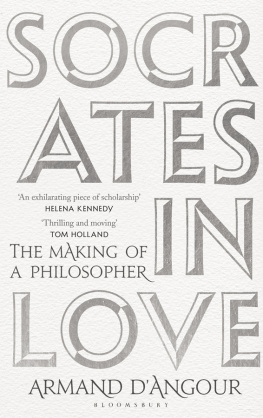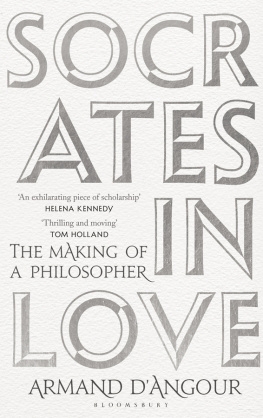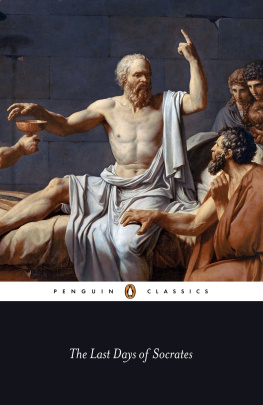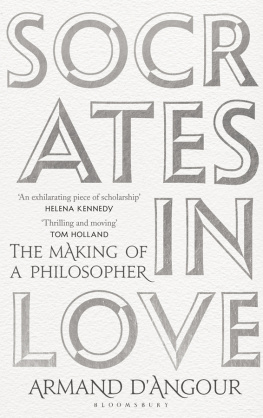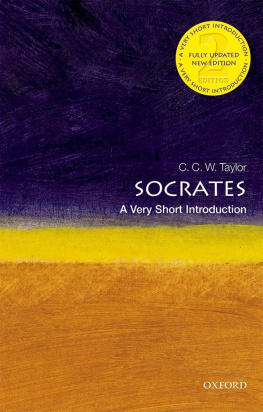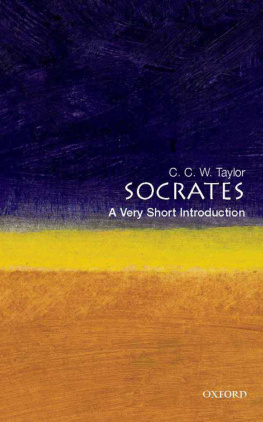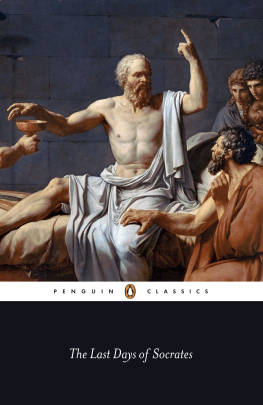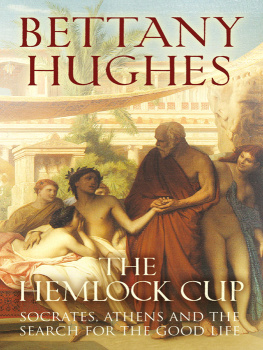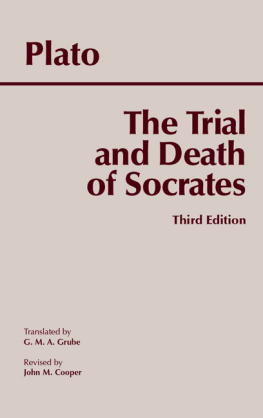Contents

SOCRATES
IN LOVE

BLOOMSBURY PUBLISHING
Bloomsbury Publishing Plc
50 Bedford Square, London, wc1b 3dp, uk
BLOOMSBURY, BLOOMSBURY PUBLISHING and the Diana logo are trademarks of Bloomsbury Publishing Plc
First published in Great Britain 2019
Copyright Armand DAngour, 2019
Map ML Design, 2019
Armand DAngour has asserted his right under the Copyright, Designs and Patents Act, 1988, to be identified as Author of this work
For legal purposes the constitute an extension of this copyright page
All rights reserved. No part of this publication may be reproduced or transmitted in any form or by any means, electronic or mechanical, including photocopying, recording, or any information storage or retrieval system, without prior permission in writing from the publishers
Bloomsbury Publishing Plc does not have any control over, or responsibility for, any third-party websites referred to in this book. All internet addresses given in this book were correct at the time of going to press. Th e author and publisher regret any inconvenience caused if addresses have changed or sites have ceased to exist, but can accept no responsibility for any such changes
A catalogue record for this book is available from the British Library
Library of Congress Cataloguing-in-Publication data has been applied for
ISBN: HB: 978-1-4088-8391-4; eBook: 978-1-4088-8390-7
To find out more about our authors and books visit www.bloomsbury.com and sign up for our newsletters
CONTENTS

For better or worse, our Socrates is Platos Socrates.
Diskin Clay
None of us really knows Socrates.
Alcibiades in Platos Symposium
Know Yourself.
Motto written on the Temple of Apollo at Delphi
The unexamined life is not worth living by a human being.
Socrates in Platos Apology
Any account of Socrates life involves selection and conjecture. Socrates in Love is not written for specialists, but it brings into focus elements of Socrates biography to which insufficient attention has been paid. The amount of published writing on Socrates is enormous, but I have restricted the bibliography to items that I have found particularly useful: paramount among these are Debra Nails comprehensive scholarly work The People of Plato and Carl Huffmans discussion of Aristoxenuss Life of Socrates, a neglected source for the philosophers life.
This book is not fiction, but my narratives of the Battle of Potidaea at the start of and of Socrates life story at the end of the book, though based on the evidence presented, are put in italics to indicate that they are imaginative recreations. Peter Rhodes and Chris Pelling gave generous and invaluable feedback on earlier drafts. I am also grateful to Michael Anderson, John Birchall, Paul Cartledge, Jeannie Cohen, Coline Covington, Madeleine Dimitroff, Tom Dimitroff, Michael Fishwick, James Morwood, Toby Mundy, Peter Thonemann, and in particular my wife, Karen Ciclitira, for their thoughts and comments.
NOTE ON CHRONOLOGY:
The Athenian year began in our month of July; so the Battle of Marathon in September 490 BC fell in the year 49089BC. For simplicity, dates in this book are given as single years; so Socrates was born in the year 4698, but the date given is .
The symbol ~ below indicates that a date or event is conjectural.
| 500 | Democracy in Athens following Cleisthenes reforms of . |
| 490 | Greco-Persian Wars: Dariuss army defeated at the Battle of Marathon. |
| 480 | Greco-Persian Wars: Xerxes fleet defeated at Battle of Salamis. |
| 470 | ~Birth of Aspasia. |
| 469 | Birth of Socrates. |
| 460 | Pericles leads Athens after the ostracism of Kimon in . |
| Hostilities between Athens and Sparta: First Peloponnesian War. |
| ~ | Pericles divorces his wife Deinomache. |
| ~ | Birth of Alcibiades. Socrates visits Samos with Archelaus. |
| 450 | ~Aspasia arrives in Athens with her father-in-law Axiochus. |
| 447 | Battle of Coronea: ~Socrates earliest military service. |
| Death of Cleinias, father of Alcibiades. |
| ~ | Pericles and Aspasia living together. |
| 440 | Pericles campaign to subjugate Samos (440439). |
| 432 | Socrates saves Alcibiades life at Battle of Potidaea. |
| 430 | The Peloponnesian War (431404) enters its second year. |
| Socrates and Alcibiades on military service in northern Greece. |
| 429 | Death of Pericles from plague. Aspasia marries Lysicles. |
| 424 | Socrates retreats at the Battle of Delium. |
| 423 | Aristophanes Clouds performed, with Socrates present. |
| 421 | Aristophanes comedy Peace. Peace of Nicias struck with Sparta. |
| 420 | Alcibiades in politics. Socrates in Xenophons Symposium. |
| 416 | Agathon wins prize for tragedy. |
| Socrates depicted in Platos Symposium. |
| 415413 | Sicilian Expedition; Alcibiades in exile from Athens. |
| 410 | Democracy restored after oligarchic coup (the Four Hundred) of . |
| 406 | Socrates on Council argues against mass execution of generals. |
| 404 | Spartan victory in Peloponnesian War. |
| Thirty Tyrants in Athens. |
| Socrates refuses to arrest Leon of Salamis. |
| 403 | Democracy restored in Athens. |
| 400 |
| 399 | Trial and execution of Socrates. |
NOTE ON THE SPELLING OF NAMES
I have used Latinate transliterations for many names, especially familiar ones (e.g. Socrates, Plato, Pericles, Miletus, Potidaea), and kept the Greek forms of others (e.g. Trygaios, Kimon, Lampros, Konnos). All who work in this area of history know that such inconsistency is unavoidable.
Who was Socrates?
Most people who know something about Socrates imagine him as a thinker, wise man, or philosopher of ancient Greece. Their image might be that of Rodins Thinker, or that of an old man with a white beard dressed in a toga. To some, his name brings to mind a method of eliciting answers to questions popularised as Socratic questioning, and his declaration that the unexamined life is not worth living. Others imagine the drama of his execution: how, put on trial and sentenced to death, he was imprisoned and made to drink poison a deadly draught of hemlock. Some will recall that Socrates had a devoted but demanding wife or mistress called Xanthippe.
The reader may imagine Socrates life and death taking place against the backdrop of ancient Athens during its Golden Age, five centuries before the birth of Christ. During that period, ancient Greek civilisation attained great heights in many areas of thought, art, and literature among other things, the Greeks invented philosophy, lifelike sculpture, magnificent architecture, and theatrical drama. The leading politician in Athens for many decades of the fifth century BC was Pericles, under whose direction Periclean Athens developed democratic institutions, became a maritime empire, and built the Parthenon.

